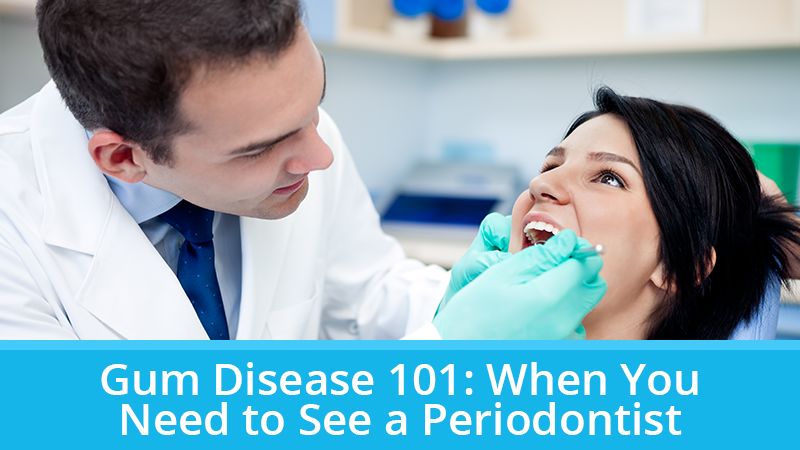Gum Disease 101: When You Ned to See a Periodontist

When bacteria builds up in your mouth, you can end up developing an infection in your gum tissues. This infection, known as gum disease, can become gradually worse without treatment and lead to tooth loss. Knowing more about this condition can help you determine when to see a periodontist for treatment.
Symptoms and Causes of Gum Disease
Gum disease occurs when you have plaque buildup in your mouth. The plaque leads your gums to become inflamed, which then leads to a condition called gingivitis. This is a mild type of gum disease that causes your gums to become red and swollen. They might also bleed when you brush your teeth. Having poor oral health is a common cause of gingivitis, but this condition can be reversed by improving your oral hygiene routine. You might be more likely to develop gingivitis if you smoke or have an underlying condition, such as diabetes or hormonal problems.
Periodontitis is a more serious form of gum disease that can develop when gingivitis is not treated in time. When this happens, plaque gets under your gum line and causes further irritation. Over time, your gum tissue recedes and the bones that provide support for your teeth wear down. When periodontitis is left untreated, your teeth can end up falling out. This condition usually does not cause any discomfort or noticeable symptoms at first. As it gets worse, you might notice that you have bad breath that won’t go away, loose teeth, changes in your bite or gums that have receded.

When to See a Periodontist
A periodontist can check your gums and evaluate your condition in order to recommend treatment. Periodontitis can be treated with scaling and root planing to get rid of plaque below your gum line. If you have lost tissue or bone, you might also need to have grafts to replace them. While treating gum disease can take awhile depending on how severe it is, keep in mind that it’s better to have it treated as early as possible. This helps lower your risk of losing teeth and prevents this condition from getting worse.
You should get in touch with a periodontist if you have any signs of gingivitis or periodontitis. Don’t wait until your next dental checkup and cleaning to have your gums examined, since gum disease grows more serious over time. Keep in mind that some types of diseases, including diabetes, have been linked to periodontal disease, which makes it even more important to seek prompt treatment.
If you have signs of gum disease, don’t put off treatment! Contact Premier Dental Care at 615-452-1292 to schedule an appointment. We provide periodontal treatment as well as routine dental care and cosmetic dentistry.
